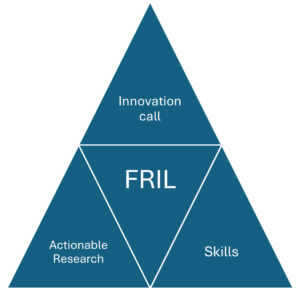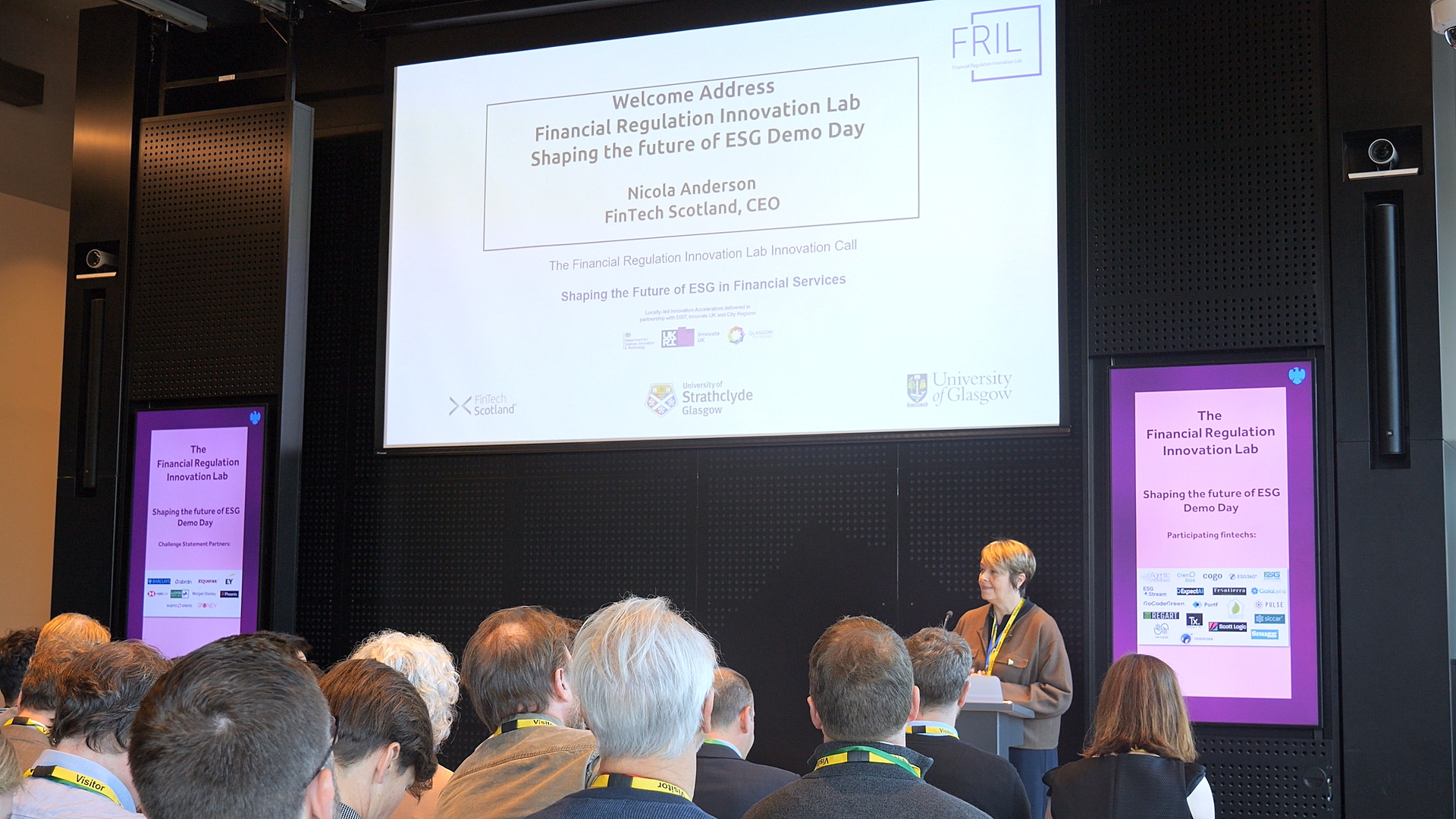Short courses, microcredentials and skills development

Financial Regulation Innovation Lab (FRIL) is a UKRI funded industry-led innovation programme that aims to address challenges and facilitate innovations in the landscape of financial regulation. FRIL comprises four pillars: innovation calls, actionable research, knowledge exchange and skills development, with each pillar informing and reinforcing each other. As part of the FRIL Team, our Skills Development Team have been focusing on developing short courses and microcredentials to support professionals in the financial sector for upskilling and reskilling. This blog focuses on the skills development aspect of FRIL.
1. Why skills development is important in FRIL?
Skills development offers clear benefits to individuals and organisations (FSSC, 2022).
For individuals, skills development enables them to update skills and knowledge, acquire new skills and capabilities, work more effectively, enhance performance, which makes them become more valuable to their current and future employers. This then translates to better career prospects.
For organisations, investing in skills development of their workforce can help increase productivity, drive innovation, enhance employee engagement, teamworking and reduce employee turnover. Engaged employees are more likely to be proactive, creative, work well with others, and be committed to achieving positive customer outcomes.
Skills development also offers benefits to policy makers. Upskilling and reskilling the workforce is key to enable a prosperous, resilient and sustainable economy. Promoting, encouraging and supporting skills development can help align with the strategic objectives of policy makers and ultimately achieve the wider social and economic benefits (Weston, 2024). For example, the Scottish Government has set an ambitious target for net zero greenhouse emission by 2045 and 75% production by 2030 (Rubio et al, 2022). This requires the workforce across industries to be timely and adequately provided with relevant green skills development training.
2. What are the external factors that drive the necessity of skills development?
2.1 Technological development
Fast changing technological development driven by industrial revolution 4.0, has changed the nature of work, where we work, how we work and what we are working on. According to OECD (2019), about 14% of jobs could be replaced and 32% transformed in the next 20 years. New jobs will be created and others becoming obsolete. The skills and knowledge needed to meet the demands of the evolving job market will continue to change, rapidly, creating skill gaps across the global economy (Stalidis & Kyriazidou, 2024). Skill development is key to adapt to this rapid change, creating both personal and organisational competitive advantage and sustainable growth.
2.2 Net zero transition:
As we are moving towards the net zero transition, new skills focused on green practices become critical. However, the demand for green knowledge and skills seems to have outpaced the supply of graduates with sustainability skills. According to PwC (2023), the number of vacancies of green jobs in the financial sector increased by three folds, from about 500 to nearly 17,000 within three years; in contrast, only 900 of them are likely to be filled by graduates trained with sustainability skills. Simply relying on graduates to fulfil the vacancies is not sufficient. Therefore, upskilling and reskilling the existing workforce in the sector through skills development programmes becomes key to address this emerging industry skill gap and where supported in public policy can address broader societal concerns with a just transition to climate change and fair work .
2.3 Changing demographics
People live longer, and they work longer (Loretto, 2016). The knowledge and skills that were acquired when they graduated will no longer sustain for the rest of their working life. They need to continue to upskill and reskill to stay competitive and meet the changing demand of the job market. Lifelong learning and skills development is important to all stakeholders in the financial services ecosystem, including the government, employers, educators and individuals.
2.4 Other drivers
Other external drivers include changing customer behaviours, products and services, as well as policies and regulations. They are particularly important to the financial sector.
3. FRIL approach to skills development
As a key pillar in FRIL, our skills development team works to address industry skill gaps, offer just-in-time and on-demand skills development courses, upskill and reskill the workforce and support the financial regulation innovation.
It is important to remember that the financial services industry is in a unique position right now, as on one hand, they need their employees to have the knowledge, skills and capabilities to follow guidelines and comply with regulations, on the other hand, they must innovate new products and services to attract new customers.
In this context, we adopted five principles to guide our skills development work. First, demand led. All our skills offerings are led by demand in the industry. These demands need to be endorsed by industry representatives. We have an Industry Steering Group and Skills Sub-group in the FRIL governance. They give feedback to our proposed skills courses both in terms of the target audience and the direction of the course. This helps us greatly in terms of making sure that the courses we are developing are addressing industry’s real demand.
Second, evidence based. We collate evidence from a variety of sources and triangulate them to validate our proposal on developing a specific course. These sources include industry reports, skills reports, contacts of FRIL’s strategic partners and the Fintech community. We are focusing on the future skills that are not only new themselves, but also the demand for which is growing rapidly.
Third, partnership enabled. Our skills team at the Adam Smith Business School work closely with Fintech Scotland and Strathclyde Business School colleagues on developing just in-time and in-demand skills programmes. We identify opportunities and feed them into each other to ensure a coherent development of short courses under FRIL.
Fourth, industry facilitated. We work closely with key members in the industry and involve them in the course development phase. These members offer us use cases, guest lectures and best practices to help us enrich our course offerings.

Figure 1. Alignment between three FRIL key pillars.
Last but not the least, the focus of our skills stream is aligned with the innovation call and actionable research. Insights and findings from the innovation call and actionable research can feed into the skills stream, and our skills development programme can also help address the challenges identified from the innovation call and actionable research.
4. Areas of focus
With the many skills in demand in the financial sector, our skills team focuses our resources and efforts and prioritises on those that are closely aligned with the FRIL innovation calls and actionable research topics. They are:
4.1 AI and compliance
Simplifying compliance through AI and emerging technologies
4.2 ESG
Supporting industry to promote and embed responsible and sustainable financial practices
4.3 Consumer duty
Supporting widening access and inclusion to those who do not currently engage or have limited engagement with financial support and information
4.4 Addressing financial crime
Supporting industry and citizens to detect and protect themselves from fraudulent actors and activities.
5. What do our skills development programmes include?
5.1 Short courses
These courses are focused and short, and usually requires 4-6 weeks’ learning.
5.2 Microcredentials
Microcredential are short courses that are credit bearing and offered by qualification awarding institutions. Microcredentials offer professionals the opportunity to claim for academic credits at the postgraduate level and stack the learning towards a higher qualification, i.e. Postgraduate Certificate. Microcredential is one of the key alternative credentials in the UK and EU learning markets and has been gaining tractions since the pandemic. They offer an effective way to upskill and reskill the workforce.
We understand not everyone has the time to undertake skills related course. In recognition of this, our skills team publish blogs and organise events to offer professionals informal learning. And finally, we also work as a catalyst and engage with the industry members to support their talent pipeline recruitment.
6. What short courses are currently on offer from the FRIL’s skill team?
6.1 AI & RegTech
Led by the University of Glasgow FRIL Skills Team, this course offers an in-depth introduction to the role of Artificial Intelligence (AI) in financial regulatory compliance within the evolving landscape of RegTech. Designed for financial professionals, compliance officers, and decision-makers, this course aims to deepen the understanding of AI, RegTech, and their integration into corporate compliance strategies and operations. It covers key concepts, challenges, opportunities, and innovations associated with AI adoption within the RegTech space.
Delivered on campus over six weeks, this course provides professional learners ample opportunities to interact and learn from the lecturers and peers.
7. What microcredentials are currently on offer from the FRIL skills team?
7.1 ESG Leadership
Led by the University of Glasgow FRIL Skills Team, this course takes a practical-application approach to Environmental, Social, and Governance (ESG) integration into organizational practice. It introduces regulatory compliance, supply chain auditing, ESG data and analytics, and leadership and innovation practices as they relate to financial services, FinTech firms, and the relevant business ecosystem. Designed for professionals who want to move into sustainability roles, work in financial institutions as functional managers and those in fintech firms, this course combines regulatory and compliance questions with strategic development and leadership.
This microcredential is delivered over 6 weeks, fully online with a face-to-face capstone to consolidate learning.
8. AI Literacy
Led by the University of Strathclyde FRIL Skills Team, a suite of five micro credentials is currently under development: AI Curious – AI Explorer – AI Enthusiast – AI Expert as well as a stand-alone module, AI for Executives, with each microcredential focusing on a particular depth of understanding of AI. Delivery will be blended with a capstone in person session to consolidate learning and will have a with a regulatory risk and compliance focus.
9. Call to action:
Hope this blog offers you a clear overview of the progress our skills team has made at FRIL and the key skills development programmes currently on offer. The courses mentioned above are all to be delivered in the autumn of 2024, and we are calling for expression of interest. We have limited funded spaces so please register your interest as soon as possible with Xiang.Li@glasgow.ac.uk (for courses: AI and RegTech, ESG Leadership) and christine.sinclair@strath.ac.uk (for courses: AI Literacy at different levels). If you would like to collaborate with our skills team, please contact us.
References:
FSSC (2022). Mind the Gaps – Skills for the Future of Financial Services 2022. [online] Financial Services Skills. London, UK: Financial Services Skills Commission. Available from: https://financialservicesskills.org/wp-content/uploads/2022/04/FSSC-Future-Skills-Interactive-V13.pdf
Government Office for Science. (2017). Skills and lifelong learning: the benefits of adult learning. [Online]. [Accessed 23 June 2024]. Available from: https://www.gov.uk/government/publications/skills-and-lifelong-learning-the-benefits-of-adult-learning
Loretto, W. (2016). Extended Working Lives: What Do Older Employees Want?. In: Manfredi, S., Vickers, L. (eds) Challenges of Active Ageing. Palgrave Macmillan, London. https://doi.org/10.1057/978-1-137-53251-0_9
OECD. (2019). OECD employment outlook 2019: the future of work. [Online]. [Accessed 20 June 2024]. Available from: https://www.oecd-ilibrary.org/sites/9ee00155-en/1/2/2/index.html?itemId=/content/publication/9ee00155-en&_csp_=b4640e1ebac05eb1ce93dde646204a88&itemIGO=oecd&itemContentType=book#:~:text=2.2.-,3.,be%20affected%20by%20deep%20changes
PwC. (2023). An emerging green skills gap in the Financial Service sector risks Net Zero goals. [Online]. [Accessed 22 July 2024]. Available from: https://www.pwc.co.uk/press-room/press-releases/emerging-green-skills-gap-in-the-financial-service-sector.html
Rubio, J.C., Warhurst, C., and Anderson, P. (2022). [Online]. [Accessed 29 August 2024]. Available from: https://www.skillsdevelopmentscotland.co.uk/media/q2lhg1v5/green-jobs-in-scotland-report_final-4.pdf?_gl=1*fts9c2*_up*MQ..*_ga*NzE4MjE0NjUuMTcyNTA0MDcwMw..*_ga_2CRJE0HKFQ*MTcyNTA1MDcyMy4yLjAuMTcyNTA1MDcyMy4wLjAuMA..
Stalidis, G., Kyriazidou, S. (2024). Job Role Description and Skill Matching in a Rapidly Changing Labor Market Using Knowledge Engineering. In: Kavoura, A., Borges-Tiago, T., Tiago, F. (eds) Strategic Innovative Marketing and Tourism. ICSIMAT 2023. Springer Proceedings in Business and Economics. Springer, Cham. https://doi.org/10.1007/978-3-031-51038-0_21
Weston, T., (2024). Importance of skills: Economic and social benefits. [Online]. [Accessed 30 August 2024]. Available from: https://lordslibrary.parliament.uk/the-importance-of-skills-economic-and-social-benefits/#:~:text=As%20well%20as%20helping%20businesses,knowledge%20and%20skills%20of%20populations”.
About the author
Dr Xiang Li work at the University of Glasgow Adam Smith Business School and contributes as researcher to the Financial Regulation Innovation Lab (a partnership funded by Innovate UK between FinTech Scotland, University of Strathclyde, and University of Glasgow).
Disclosures
I acknowledge funding from Innovate UK, award 10055559, Financial Regulation Innovation Lab.
Open Access. Some rights reserved.
Open Access. Some rights reserved. The publishers, the University of Glasgow and FinTech Scotland, and the author, Xiang Li, want to encourage the circulation of our work as widely as possible while retaining the copyright. We therefore have an open access policy which enables anyone to access our content online without charge. Anyone can download, save, perform or distribute this work in any format, including translation, without written permission. This is subject to the terms of the Creative Commons By Share Alike licence. The main conditions are:
• The University of Glasgow, FinTech Scotland, and the authors are credited, including our web addresses www.gla.ac.uk, and www.fintechscotland.com
• If you use our work, you share the results under a similar licence
A full copy of the licence can be found at https://creativecommons.org/licenses/by/4.0/
You are welcome to ask for permission to use this work for purposes other than those covered by the licence.
We gratefully acknowledge the work of Creative Commons in inspiring our approach to copyright. To find out more go to www.creativecommons.org




